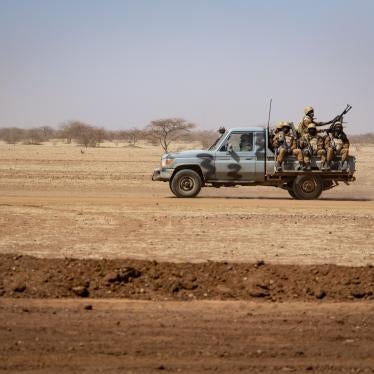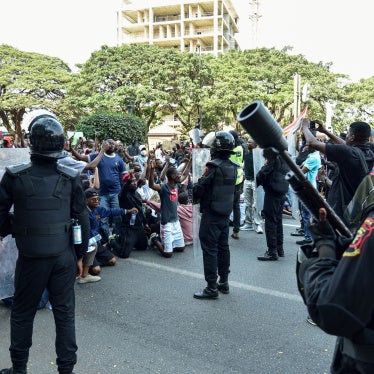Human Rights Watch condemns the arrest yesterday of opposition leader Etienne Tshisekedi and calls on the government of the Democratic Republic of Congo (DRC) to release him immediately.
On the evening of Thursday, February 12, 1998, some sixty soldiers and policemen stormed the Kinshasa residence of Etienne Tshisekedi, leader of the opposition Union for Democracy and Social Progress (UDPS), and arrested him and his guards. Other troops surrounded the UDPS' headquarters and its secretary general's home in the same neighborhood. As the news spread and supporters converged on the area, soldiers dispersed and arrested up to twenty of them. In a blatant effort to cover up this latest instance of assault on internationally recognized democratic freedoms, the DRC's Minister of Agriculture told a hurriedly convened press conference on February 13 that the government has sent Mr. Tshisekedi to his native village in Kasai province to allow him an opportunity to lead local reconstruction and food security efforts there.
This assault occurred hardly two days after the DRC government officially declined to meet with the Reverend Jesse Jackson, President Clinton's special envoy for democracy in Africa, and blamed him for having met with opposition figures including Tshisekedi and other leaders of the civil society.
Attacks on leaders of the democratic opposition have grown more frequently recently. For example, police arrested ten journalists on November 28, 1997, for having attended a press conference by opposition leader Z'Ahidi Ngoma. The ten were taken to a military compound in Kinshasa where they were undressed and given twenty to forty lashes each. Ngoma himself, founder of the opposition group Forces of the Future, was arrested and in early February, he was transferred to Lubumbashi, the capital of Katanga region. On the same airplane with Ngoma was Joseph Olengankoy, another opposition leader arrested in Kinshasa. The move seemed intended to keep both men away from their support base in the capital.
In December 1997, soldiers occupied the Kinshasa daily Elima and pillaged its property; in early January 1998, troops occupied and ransacked the offices of Le Moniteur de L'Economie, a business weekly.
Yesterday, authorities granted a temporary release to Roger Sala Nzo Badila and Nyabirungu Mwene Songa, respectively secretary and chairman of the Kinshasa-based National Center for Human Rights. They had spent nearly three months in pretrial detention, and still face charges of endangering state security for publishing a report criticizing the human rights record of the DRC government.
Finally, as if the threat of prolonged arbitrary detention, beatings and destruction of property was not sufficient to silence dissent, President Kabila and his minister of interior took the added precaution in mid-January of threatening to try whoever challenges the ban on political activities before a military court. On January 23, a military court jailed two opposition politicians, Professor Mathieu Kalele and Jean-Francois Kabanda, who are leading members of the UDPS, for two years on charges of spreading seditious rumors.
Human Rights Watch is deeply concerned that denying political space to the opposition, the press and civil society will only increase tensions within the Congolese society and create a negative environment where uncontrolled violence could explode.
Human Rights Watch calls on the Congolese government to immediately release Etienne Tshisekedi and all other political detainees. We call on the government to guarantee the full respect of human rights and fundamental liberties, taking concrete steps in this regard to establish an independent judiciary; end the trial of civilians bef military courts; institute safeguards against torture and ill-treatment, including by bringing all detainees before a judicial authority without delay; ending routine incommunicado detention; and providing for prompt and regular access to detainees by relatives, doctors and lawyers. We also call on the government to lift the ban on political activities, respect freedom of expression, and uphold the right to peaceful assembly. The government of the DRC should recognize the rights of human rights defenders in the country to monitor, investigate, and speak out on human rights concerns and to associate freely with others nationally and internationally in the promotion and protection of human rights.
Human Rights Watch urges all members of the international community to make bilateral and multilateral assistance to the central government of the Congo contingent upon the government's meeting a series of calibrated benchmarks over time. Minimum conditions for international aid to the government should be: demonstrable and tangible progress in the investigation of reported civilian massacres in the DRC during episodes f its recent history and improved respect for the rule of law, human rights, and democratic principles by the Congolese government.








